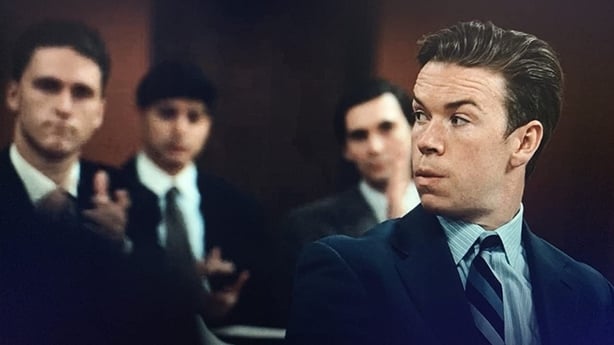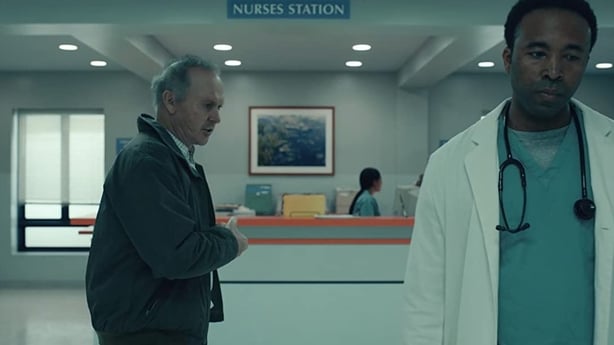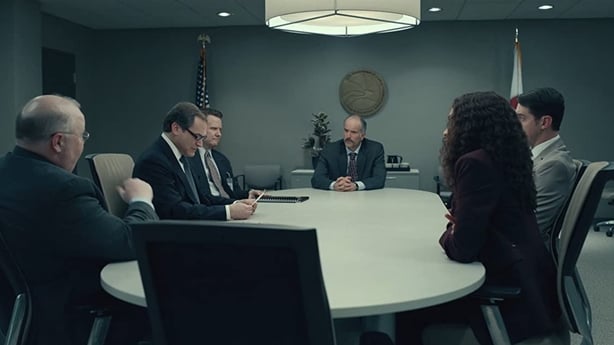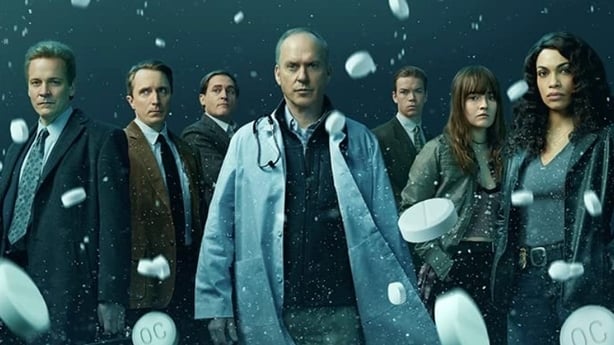Dopesick is a new drama that deals with one of the major outrages in recent USA history. John Byrne speaks to the show's creator and writer Danny Strong about the bad boys of Big Pharma.
Ever heard of Dopesick? No? Well, me neither - until the Disney+ guys dropped me a line about a new show they were going to stream and offering interviews. It’s very much an American story, and explains why so-called 'Big Pharma’ is so despised and mistrusted over there.
Dopesick examines how one company triggered the worst drug epidemic in the history of the United States, and the limited series is inspired by Dopesick: Dealers, Doctors, and the Drug Company That Addicted America, the New York Times best-selling book by Beth Macy.
Executive Producer Danny Strong first came up with the idea of turning this remarkable and quite terrifying story into a TV series (more on that later), while Michael Keaton came on board to both star in and executive produce the series.
The drama takes viewers to the epicentre of America's struggle with opioid addiction, from the boardrooms of Big Pharma, to a distressed Virginia mining community, to the hallways of the DEA.
But it's also about defying all the odds as mere people come up against the might of a corporation, heroes emerged to take on and eventually take down the craven corporate forces behind this crisis and their allies.
It’s a fairly harsh rebuke of Big Pharma, the health care system and the American government's long inaction on opioids. But - hey! - that’s how capitalism works, folks.
Unrelenting in its tragedy, irony and criticism, the series spans the mid-1990s to the mid-2000s as the crisis intensifies across the USA.
The primary subjects in Dopesick are the billionaire Sacklers who own the company Purdue. Up against them is DEA agent Bridget Meyer (played by Rosario Dawson), who's obsessed with getting the drug OxyContin under control.
Other key characters are two US attorneys (Peter Sarsgaard and John Hoogenakker) trying to build a case against Purdue, and Appalachian family doctor Samuel Finnix (Keaton) and the Purdue sales rep (Will Poulter) who's hounding him to prescribe Oxy.

One of Finnix’s young patients, Betsy Mallum (Kaitlyn Dever), is a Virginia coal miner who becomes addicted after taking the drug to help with a back injury.
On top of that, the first two episodes of Dopesick are directed by the legendary Barry Levinson, whose lengthy CV includes Diner, Good Morning Vietnam, Bugsy, Wag the Dog and Rain Man.
Creator and writer Danny Strong may be known to you from the likes of his roles as Jonathan Levinson in Buffy the Vampire Slayer and Doyle McMaster in Gilmore Girls.
He also wrote the screenplays for the two-part finale of The Hunger Games film trilogy, Mockingjay - Part 1 and Mockingjay - Part 2. Strong is also a co-creator, executive producer, and writer for the Fox series Empire.
It may not need stating, but he’s certainly no slouch.
John Byrne: Hi Danny. Can you give us some background about Dopesick, and how it all came together?
Danny Strong: I came up with the show and sold the show before I knew the book existed. And then another studio at the same company purchased the book, not knowing that I’d sold another studio the show. Then they asked us to team up. There was a little bit of Hollywood dysfunction there. But I loved the book and was happy to team up with them.

It actually came to me from a producer named John Goldwyn, who approached me about doing a film on the Sackler family, and this was after there was a big New Yorker article, written by Patrick Radden Keef that blew the whole story up in the United States.
So, I started researching. I went from the article to multiple books already written about the Sacklers and OxyContin pharma. I started reading the books and it just becomes a rabbit hole of you just can’t believe the criminal behaviour of this company. And how it was micromanaged by one family. They’d made billions off of so much lies, deception and suffering. It’s kind of overwhelming.
I called it a rabbit hole and when I said that to reporters who were covering it, everyone agrees. You become obsessed with this because it’s just so shocking on so many levels.
The series covers three different time periods and weaves the story by interweaving them. Can you explain how you approached that and why you took the path you did with the story?
I didn’t make it easy on myself by making it take place in three different time periods! But I didn’t really have a choice. I really wanted to make the US Attorney’s case the spine of the show. I thought that investigation would be a great narrative to drive throughout the piece, and then intercutting it with what Purdue was doing. And then intercutting that with the people who are suffering from Purdue. So it was very complicated.

At the same time, once I’d figured it out in the pilot, I just kept it going. But it was one of those things where it would change, even in post-production. I was constantly reordering scenes as I was editing the episodes to make the timeline work better.
What I discovered in post was that it was just better if I could stay in one time period for a longer period of time. So, instead of one or two scenes in a time period, I’d make it there or four scenes, and it would make it a smoother ride.
How about Beth Macy? The story of what happened obviously brought you together. How did that process work?
Beth Macy’s a lovely woman and incredible reporter, and she was in the writer’s room on the project. So she was there full-time, as one of the writers in the writers’ room.
And then Beth and I continued our investigation all the way through production. So it wasn’t just during the writing process, then we had the scripts and then stopped fact-finding. We actually kept doing interviews - sometimes together, sometimes separate - and then we’d come back and share notes. It was great.

And also, to do interviews with. Her, because she’s a real journalist and I play one on TV, right? So it was getting to see what she did and how she did it really helped me a lot in my own reporting. So I channel Beth Macy in my next non-fiction project.
For me, the cherry on the cake here is having Barry Levinson in the director’s chair for the opening two episodes. Can you tell us a bit about that?
How did Barry get involved? Well Barry is a legend, obviously. He was a childhood hero of mine. Those films in the Eighties and the Nineties were so influential one me. And I’ve been lucky enough to become friends with him over the last several years, because we live near each other in New York City.
So we would have breakfast - I don’t know - every there months or so, and when it came to finding a director for this, he was my first idea. Mainly because of the HBO movies he’s been making for the last eight or nine years. They were a really good template, I thought, for a director for this.
He’d also just made a film called The Survivor. It premiered at Toronto just recently to great reviews. But he showed me a cut of it and it was just fantastic. There’s something kind of awe-inspiring when a director is 79-years-old and can throw a 95-per-hour fastball.
He’s been keeping it, artistically, for decades, and I feel the same about Mike Nichols and Martin Scorsese, and those directors where their artistry down’t fade. It only seems to get better.
We thought how amazing it would be to get him to direct. And then he said yes. So it was thrilling start to the process.
Have Purdue Pharma made any legal moves towards preventing the production or broadcast of this show? I’d imagine they’d prefer if Dopesick did not exist?
No one threatens to sue people more than Purdue Pharma. And at the same time, they never actually sue. I believe the reason why they never actually sue is because they are criminals. It is a criminal company. They’ve pled guilty to many crimes.
I find it’s just a bullying tactic that they use. I think they never follow up on it. And I think it would be nice if they didn’t this time - let’s see what happens . . .
The blowback from them has been these kind of petty letters that they’ve been sending us for almost a year now, from Richard Sackler’s lawyer. I think he gets paid per letter because they’re so silly to me. They try and point out ‘Beth Macy used this word instead of that word, so you have to be careful of her’. And I go: ‘Yeah, we’ll be careful.’
It’s constantly stuff like that. And there’s been some online harassment . . . It’s completely out of their playbook, and we even use some of it in the show.
Dopesick is on Disney+ from Friday November 12


